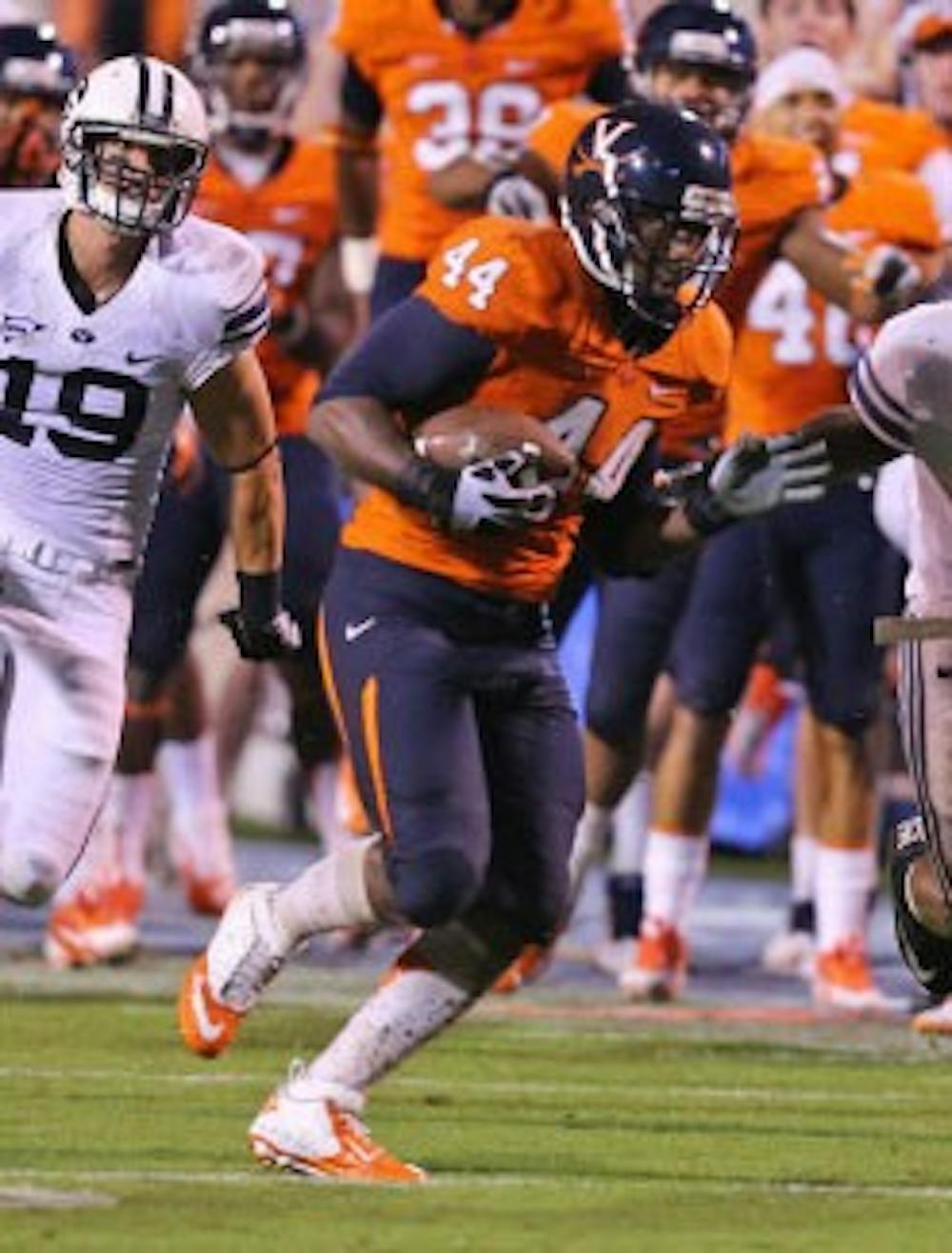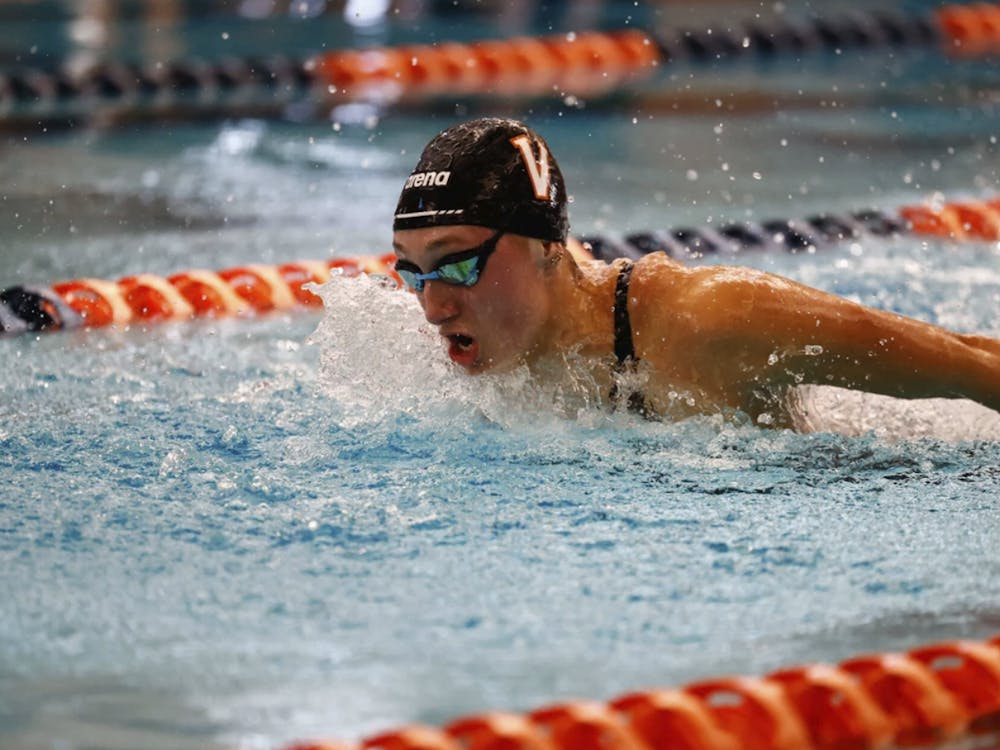By most statistical measures, the Virginia defense was no better than mediocre in 2013, when the team surrendered 399 points in 12 games to post the 98th best scoring defense in college football.
The Cavaliers floundered after staunch early-season performances against Brigham Young, Virginia Military Institute and Pittsburgh, ceding 48 points to Ball State Oct. 5 to commence a porous seven-game stretch in which opponents torched coach Mike London’s team for 42 points per game.
This year, the Virginia defense will look to rebound from its disheartening finish to 2013 behind an experienced corps of returning starters and a few talented, newer faces. The Cavaliers have a full year under defensive coordinator Jon Tenuta in the rearview mirror, and safeties coach Mike Archer said the team has made clear strides this offseason.
“I think we’re playing faster,” Archer said. “I think [our guys] understand the terminology, and I think they understand what the expectations are and what we’re trying to do as a defense, No. 1, [and] what we’re trying to do as a defensive staff.”
The Cavaliers have playmakers at every level of the defense, starting along the line where junior Mike Moore will team with junior Eli Harold, an established star with 8.5 sacks and two forced fumbles in 2013, at defensive end. Moore was a reserve last year, appearing in 11 games and starting one, but earned a more prominent role to start 2014 after trimming down to speed up.
Junior defensive tackle David Dean, for his part, has the confidence of defensive line coach Jappy Oliver in the lead-up to Saturday’s opener against No. 7 UCLA.
“David’s one of my leaders of the group up front,” Oliver said. “He’s a lunch-pail guy. He’s a warrior, and in the trenches I’ll put him up against anybody at this point in time.”
Sophomore Donte Wilkins or freshman Andrew Brown will line up beside Dean at defensive tackle to complete the front four. Brown, the 2013 Gatorade National Player of the Year out of Oscar Smith High School in Chesapeake, suffered turf toe and shoulder injuries this offseason, but is now healthy enough to play.
London said out of the freshmen defensive players, Brown and safety Quin Blanding have the best chance of playing early in the year.
“[Andrew’s] practiced — he’s full-go,” London said. “With the multiple fronts that we run, there may be an opportunity to play. One of the things with all these freshmen: there are not too many freshmen we plan on playing this particular year right now.”
The linebackers atop the depth chart heading into the UCLA game already possess the in-game mettle Brown and Blanding are looking to gain this fall. Seniors Daquan Romero and Henry Coley, a team captain and 2013 All-ACC Academic Team selection, combined for 23 starts and 180 tackles last year. They will be joined by sophomore Max Valles, a six-foot-five sophomore who recorded four sacks while appearing in 10 games in 2013.
The Virginia secondary will likely be ready if UCLA redshirt junior quarterback Brett Hundley or any other signal-caller looks to air it out. Blanding and senior strong safety Anthony Harris will serve as the last line of defense for a unit that allowed 232.9 passing yards per game in 2013, while senior cornerback Brandon Phelps and junior cornerback Maurice Canady will attempt to lock down opposing receivers.
Senior DreQuan Hoskey and sophomore Tim Harris — who combined for 17 starts in 2013 — give cornerbacks coach Chip West two additional capable veterans. Senior Demetrious Nicholson will also be back in the rotation once fully recovered from the turf toe injury which ended his junior year in Week Five.
Anthony Harris led the nation with eight interceptions as a junior, earning first-team All-ACC honors and setting a program record with at least one pick in five consecutive games. Blanding, the No. 10 recruit in the class of 2014 per ESPN.com, is unlikely to match Harris’s production in his freshman season, but his tackling in Virginia’s preseason games impressed Archer.
Archer said strong play from the secondary is a must in today’s college-football landscape, where teams routinely line up several wide receivers and make the passing game their offense’s featured element.
“That’s what college football has become,” Archer said. “It’s fast-break basketball on a field. You’ve got to match up speed with speed, and you’ve got to be able to play in space.”
While Saturday’s opener against the Bruins will provide an early measurement of Virginia’s improvement on defense, London said the team cannot read too much into its final score — especially because the Cavaliers have 12 games to play.
“I know it’s cliché, but for us it’s very important that we do play one game at a time and one opponent at a time,” London said. “We recognize the formidable opponent that we have with UCLA. We also know that there are games after them. We have the guys that we believe could be the productive guys on the field to help you win games.”






